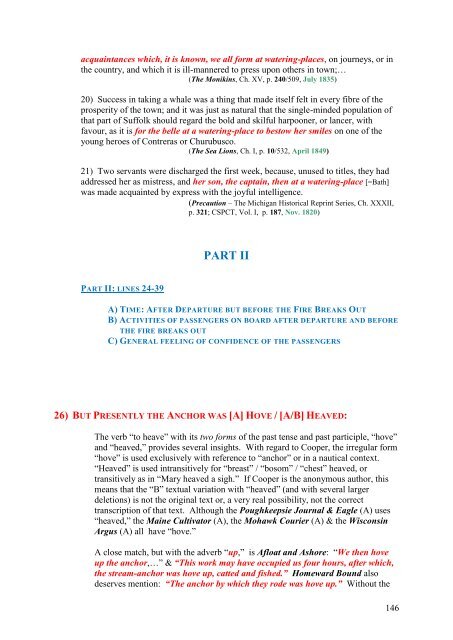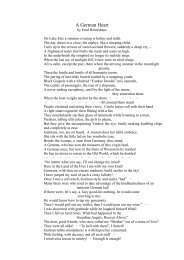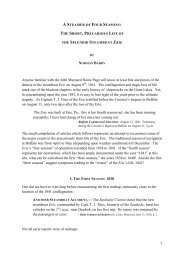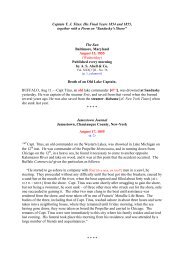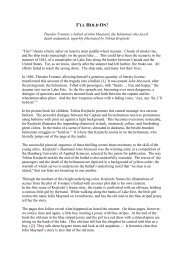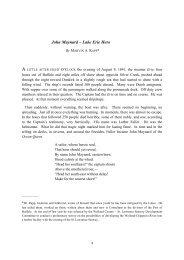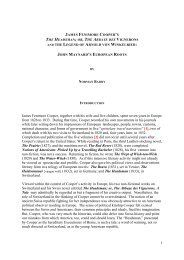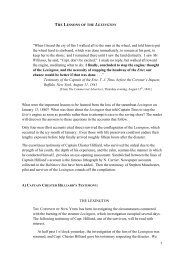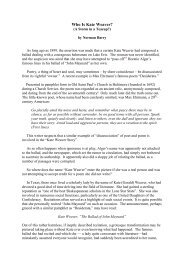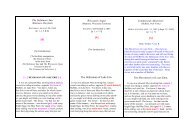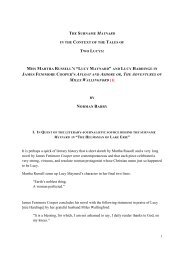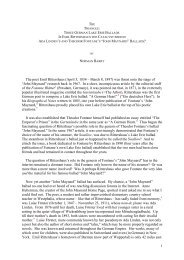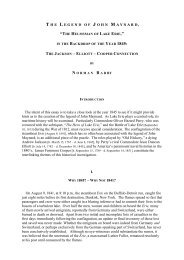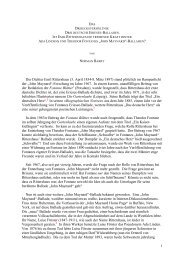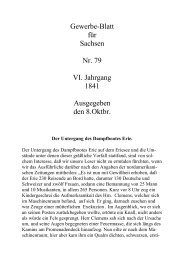- Page 1 and 2:
A LANGUAGE COMPARISON OF THE WRITIN
- Page 3 and 4:
The Prairie, The Library of America
- Page 5 and 6:
serenity of a virgin forest, the la
- Page 7 and 8:
25 30 35 40 45 50 55 60 65 er fare;
- Page 9 and 10:
120 125 130 135 140 145 150 155 160
- Page 11 and 12:
13) ―The + [proper noun] — + fo
- Page 13 and 14:
ENTRY LINE NO. PAGE ENTRY NO. NO. 5
- Page 15 and 16:
93) ―without a scream or a groan
- Page 17 and 18:
H, #2). He is proud of his professi
- Page 19 and 20:
M) METAPHORICAL SENSE N) THE TERM
- Page 21 and 22:
D) A HELMSMAN‘S SENSE OF DIRECTIO
- Page 23 and 24:
―Boat ahoy!‖ (Homeward Bound, C
- Page 25 and 26:
1) When, however, he [=Jasper] was
- Page 27 and 28:
6) ―These great lakes, you must k
- Page 29 and 30:
2) The occupation of Fort George br
- Page 31 and 32:
It should also be noted that Mary S
- Page 33 and 34:
movements of the port and town. Ita
- Page 35 and 36:
9) The weather is like May. I saw g
- Page 37 and 38:
E) ―JUNE:‖ 1) in the pleasant m
- Page 39 and 40:
4) ―STEAM VESSEL‖ (The Lake Gun
- Page 41 and 42:
where we shall find him and his fri
- Page 43 and 44:
26) Caroline is riding at anchor, e
- Page 45 and 46:
comment in ―The Helmsman‖ [line
- Page 47 and 48:
D) KNOW + OF COURSE 1) ―You know,
- Page 49 and 50:
JAMES FENIMORE COOPER: 1) The Pathf
- Page 51 and 52:
15) ―Here!‖ exclaimed the missi
- Page 53 and 54:
4) ―Were the Huron born of the pe
- Page 55 and 56:
I. WILLIAM SHAKESPEARE (1564-1616):
- Page 57 and 58:
2) Indeed, one who has seen no othe
- Page 59 and 60:
(The Pathfinder, Ch. XXV, p. 553/64
- Page 61 and 62:
1) We were rewarded for the excursi
- Page 63 and 64:
―By heaven, Tom,‖ cried Barnsta
- Page 65 and 66:
London and Philadelphia) 2) The roa
- Page 67 and 68:
fancied (1x), have generated (1x),
- Page 69 and 70:
1) Here, it might well be thought t
- Page 71 and 72:
For an in-depth consideration of th
- Page 73 and 74:
2) The American is justly proud of
- Page 75 and 76:
ocks of Jersey were gathered into a
- Page 77 and 78:
32) ―We begin to tire of this con
- Page 79 and 80:
not cloudy, too, in its appearance.
- Page 81 and 82:
June 1828: England; August 1828: Un
- Page 83 and 84:
had sold the last of his stock, but
- Page 85 and 86:
24 SPECULATIONS. of the stronger em
- Page 87 and 88:
ailing round the boat, and a floati
- Page 89 and 90:
River, and the Washington Steam-boa
- Page 91 and 92:
ordinary ship-channel of the port,
- Page 93 and 94:
U.S. Ship. Macedonian, Sandy Hook,
- Page 95 and 96: Yale is about as well attended. The
- Page 97 and 98: 4) He often pronounced the word, Oz
- Page 99 and 100: intended by the author. Although th
- Page 101 and 102: 2) ―And that is the reason he has
- Page 103 and 104: and the flags of most of the mariti
- Page 105 and 106: 4) …my ―bright and beauteous br
- Page 107 and 108: Gleanings in Europe: The Rhine (Coo
- Page 109 and 110: 14) The sun rose, the morning of he
- Page 111 and 112: HELMSMAN: ―The Jersey ― for tha
- Page 113 and 114: THE HELMSMAN: ― porters were hurr
- Page 115 and 116: 7) The ship went immediately alongs
- Page 117 and 118: 11) I saw, in Stone‘s paper, a fe
- Page 119 and 120: 13) The lineaments of Mrs. Lechmere
- Page 121 and 122: C) ―FAREWLL‖ IN THE CHAINBEARER
- Page 123 and 124: 8) ―When the idlers of the Proser
- Page 125 and 126: (The Last of the Mohicans, Cooper E
- Page 127 and 128: 60) ―All the idlers keep as close
- Page 129 and 130: ) PUCK. Believe me, king of shadows
- Page 131 and 132: (Mercedes of Castile, Ch. I, p. 25,
- Page 133 and 134: (The Monikins, Ch. XXV, p. 426/509,
- Page 135 and 136: 5) Although in a perfect state of r
- Page 137 and 138: 28) ―In the mean time, Joel‘s p
- Page 139 and 140: 1, Letter III, p. 64/315, 1837) 48)
- Page 141 and 142: 7) The bustle of a general departur
- Page 143 and 144: (Recollections of Europe, LETTER II
- Page 145: 11) ―Is it not a droll life Sir W
- Page 149 and 150: ) ―The eye of Jacopo gleamed with
- Page 151 and 152: London and Philadelphia) 10) ―The
- Page 153 and 154: 2) ―…I‘ve been shaping my cou
- Page 155 and 156: 30) ―MINGLED IN THE BUSY CONVERSA
- Page 157 and 158: 20) ―There it came, however, more
- Page 159 and 160: (The Prairie, Ch. XXXII, p. 1288, T
- Page 161 and 162: 2) The election effects are tremend
- Page 163 and 164: human calculations. The proposition
- Page 165 and 166: 32) ―WRAPPED UP IN A BOOK.‖ Coo
- Page 167 and 168: 13) ―Beyond a question, the Ameri
- Page 169 and 170: 35) ―IN SHORT‖ (The Journal of
- Page 171 and 172: 37) ―… ONE AND ALL WERE LIKE ME
- Page 173 and 174: The Crater - CSPCT, Vol. 30, Ch. XV
- Page 175 and 176: 6) ―It was a peculiarity of this
- Page 177 and 178: 29) ―I dare say, Chainbearer, tha
- Page 179 and 180: 2) There was no opening to the nort
- Page 181 and 182: Andries/The Chainbearer, Mrs. Bradf
- Page 183 and 184: two gentlemen, accompanied by the o
- Page 185 and 186: C) MAYNARD = IRON-HEART 1) ―At th
- Page 187 and 188: 41) BLUFF The OED‘s positive conn
- Page 189 and 190: (The Red Rover - Cooper Edition/SUN
- Page 191 and 192: vigilant sagacity, and of exquisite
- Page 193 and 194: JAMES FENIMORE COOPER: A) TANNED: 1
- Page 195 and 196: (The Red Rover - Cooper Edition/SUN
- Page 197 and 198:
8) ―…and then I [Jasper] always
- Page 199 and 200:
Safe from the wintry tempest. Flutt
- Page 201 and 202:
13) Although the battle of Bunker H
- Page 203 and 204:
one before you‘re t‘irtty; but
- Page 205 and 206:
10) ―An hour before the moment wh
- Page 207 and 208:
(The Two Admirals, Ch. XIV, p. 116/
- Page 209 and 210:
(Home as Found - CSPCT, vol. 19, Ch
- Page 211 and 212:
himself, by a very natural operatio
- Page 213 and 214:
49) ―KNOWN FROM ONE END OF LAKE E
- Page 215 and 216:
ENTRY THE PILOT (1823) THE RED ROVE
- Page 217 and 218:
II. BOAT-STEERER 1) …It was much
- Page 219 and 220:
4) ―I could have sworn he was an
- Page 221 and 222:
find birds that have been at sea fi
- Page 223 and 224:
6) ―Carrying chain I like; it giv
- Page 225 and 226:
qualities among people more artific
- Page 227 and 228:
1) A community of hazard makes a co
- Page 229 and 230:
obligations of universal charity, h
- Page 231 and 232:
14) ―As absurd as all this may se
- Page 233 and 234:
26) They conversed a few minutes on
- Page 235 and 236:
7) It was difficult to find, Robert
- Page 237 and 238:
Richard Fletcher and J. Pickering,
- Page 239 and 240:
have been concerned in the equipmen
- Page 241 and 242:
3) While Barnstable was speaking, a
- Page 243 and 244:
tar-bucket filled at hand, and this
- Page 245 and 246:
A quite different example, though s
- Page 247 and 248:
60) ―BUCKETS OF WATER‖ Quotatio
- Page 249 and 250:
9) He had often remarked that sea w
- Page 251 and 252:
62) ―THE BURNING MASS.‖ Quotati
- Page 253 and 254:
LINES 90-106: PART V A) MAYNARD QUE
- Page 255 and 256:
were now clustering in a clamorous
- Page 257 and 258:
67) ―BE [GET, COME, BRING US ] IN
- Page 259 and 260:
2) ―To say the truth, the country
- Page 261 and 262:
―Is there new danger?‖ asked th
- Page 263 and 264:
1840, London and Philadelphia; Libr
- Page 265 and 266:
24) ―Go, go. This is idle talk -
- Page 267 and 268:
2) ―I wish, my dear Miles, if the
- Page 269 and 270:
15) ―It would be easy to expend h
- Page 271 and 272:
from the youthful and beautiful Ros
- Page 273 and 274:
Thus expired Sir Gervaise Oakes, fu
- Page 275 and 276:
LINES 107-139: PART VI A) DIALOGUE
- Page 277 and 278:
(Homeward Bound - CSPCT, vol. 18, C
- Page 279 and 280:
(Ned Myers, Ch. XII, p. 166/271, No
- Page 281 and 282:
5) We could do no more than throw h
- Page 283 and 284:
5) ―…they expended their utmost
- Page 285 and 286:
did not betoken any of the refineme
- Page 287 and 288:
32) ―As it would be very natural
- Page 289 and 290:
1838) 5) ―The graceless rascals o
- Page 291 and 292:
80) ―[COATS AND] WAISTCOATS.‖ T
- Page 293 and 294:
2-3) Marmaduke appeared in a suit o
- Page 295 and 296:
18) The coat was scarlet, with butt
- Page 297 and 298:
3) I was on the point of calling ou
- Page 299 and 300:
2) ―Though evidently so near its
- Page 301 and 302:
2- (The Two Admirals - Cooper Editi
- Page 303 and 304:
19- (The Two Admirals - Cooper Edit
- Page 305 and 306:
had they pursued a different course
- Page 307 and 308:
55) ―Hurrah! Corny, my noble fell
- Page 309 and 310:
HELMSMAN: ―I‘ll try, Sir.‖ ..
- Page 311 and 312:
(Oak Openings - CSPCT, Ch. VI, p. 6
- Page 313 and 314:
The men did bail, and the danger wa
- Page 315 and 316:
8) ―Twenty times did the young ma
- Page 317 and 318:
1) ―…until I could give him his
- Page 319 and 320:
24) ―The naked, tawny bodies of t
- Page 321 and 322:
44) ―The muzzles of the threateni
- Page 323 and 324:
90) ―CRACKED‖ - A_1 & ―CREAKE
- Page 325 and 326:
3) Cracked - A : Wisconsin Argus (M
- Page 327 and 328:
1) ―On the center of the board wh
- Page 329 and 330:
8) Then came a murmur, like a sigh
- Page 331 and 332:
(The Deerslayer, Ch. VI, p. 126/717
- Page 333 and 334:
oken her back, as it is termed, and
- Page 335 and 336:
92) ―BORE THE AGONY.‖ Cooper pr
- Page 337 and 338:
15) ―He ceased to suffer pains ho
- Page 339 and 340:
advanced to the assistance of Prude
- Page 341 and 342:
21) But there hung the victim, susp
- Page 343 and 344:
34) On every side arose shrieks, gr
- Page 345 and 346:
or vegetable? My duty was clearly t
- Page 347 and 348:
1) As twenty muskets and pistols we
- Page 349 and 350:
2) ―Another will made and destroy
- Page 351 and 352:
―God is with us all, Hetty - in t
- Page 353 and 354:
98) ―THE LAST SOUNDS THAT HE HEAR
- Page 355 and 356:
99) ―HOW HE PERISHED‖ HELMSMAN:
- Page 357 and 358:
100) ―DIZZIED BY THE SMOKE.‖
- Page 359 and 360:
(Precaution, Ch. III, p. 52/532, No
- Page 361 and 362:
33) ―Mike buried himself like a m
- Page 363 and 364:
2) When he suddenly and affectionat
- Page 365 and 366:
19) ―To you, Opportunity, I owe t
- Page 367 and 368:
III. JAMES FENIMORE COOPER (1789 -
- Page 369 and 370:
2) ―Pawnee, I die as I have lived
- Page 371 and 372:
I. JAMES FENIMORE COOPER: A) I/WE H
- Page 373 and 374:
20) There were moments when religio
- Page 375 and 376:
9) ―…and so long as you remaine
- Page 377 and 378:
II. NATHANIEL HAWTHORNE: A) I/WE HA
- Page 379 and 380:
1) ― ….all I say is, I have kep
- Page 381 and 382:
of decision and resignation, that p
- Page 383 and 384:
JAMES FENIMORE COOPER: I. FATHER: 1
- Page 385 and 386:
(The Deerslayer, Ch. XIII, p. 286/7
- Page 387 and 388:
7) This was the castle, all the res
- Page 389 and 390:
6) We are in the hands of Providenc
- Page 391 and 392:
powers in its stead. (The Sea Lions
- Page 393 and 394:
gratitude by showing, through the c
- Page 395 and 396:
eflection. His end had been happy;
- Page 397 and 398:
Lines on [John] Trippe, [unlocated]
- Page 399 and 400:
Daughter! thou canst not stay.‖
- Page 401 and 402:
….In no one were these virtuous h
- Page 403 and 404:
I have thought of the Inland Sea. A
- Page 405 and 406:
The Letters and Journals of James F
- Page 407 and 408:
4) ―You have been abroad, Mrs. Bl
- Page 409 and 410:
16) The rain and thaw produced anot
- Page 411 and 412:
driven the Scud beyond the line of
- Page 413 and 414:
II. Volumes II & III of the Littlep
- Page 415 and 416:
4) Gleanings in Europe: The Rhine.
- Page 417 and 418:
V. THE MICHIGAN HISTORICAL REPRINT
- Page 419:
In spite of the aforesaid hurdles,


